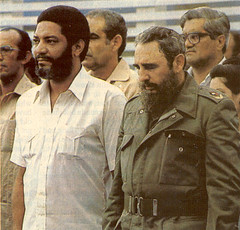
Former Grenada Prime Minister Maurice Bishop With President Fidel Castro in Cuba
Originally uploaded by panafnewswire
By Stephen Millies
Published Jun 14, 2009 9:09 PM
Grenada’s international airport was renamed after Maurice Bishop on May 29. It would have been the late revolutionary leader’s 65th birthday.
Thousands of Grenadians rallied the next day at the airport to celebrate. Bishop’s 94-year-old mother, Alimenta Bishop, was there. So were his partner, Angela, and their children, Nadia and Johnny. Many people wore T-shirts with Bishop’s face and the slogan “A dream come true.” (Grenada Herald, May 31)
Grenada lived through a nightmare when the U.S. invaded on Oct. 25, 1983. President Reagan sent 7,000 troops and two aircraft carriers to attack a country with only 110,000 people. U.S. planes bombed the Richmond Hill Psychiatric Hospital, killing 47 patients. The Pentagon claimed “armed patients and staff” were ready “to resist our forces.” (WW, Nov. 10, 1983)
For a country dependent on tourism, having an airport that can handle jet aircraft is a necessity. Grenada Prime Minister Maurice Bishop sought and received Cuban assistance to build the airport.
Reagan claimed it was going to be a Soviet air force base. Bishop pointed out that a Miami firm spent nine months dredging the site. ABC’s “Nightline” program repeated Reagan’s stupid lie.
Grenadians remember the truth. During the country’s 2008 election, Grenada Prime Minister Tillman Thomas promised to rename the airport after Maurice Bishop.
At the rally Thomas called the airport “a lasting testimony of Caribbean solidarity as displayed by the hardworking Cuban technical cooperation team.” (The Barnacle, June 3)
Cuban Vice President Estaban Lazo Hernandez spoke about Maurice Bishop and his friendship with Fidel Castro. Other honored guests included Dominica Prime Minister Roosevelt Skerrit and St. Vincent and the Grenadines Prime Minister Dr. Ralph Gonsalves. (Juventud Rebelde, June 1)
“Grenada and Maurice have come home symbolically and in reality. ... This belated honor to an outstanding Caribbean son will bring closure to a chapter of denial in Grenada’s history,” said Dr. Gonsalves. (Grenada Herald, May 31) Gonsalves had been Bishop’s friend. He led protesters at the University of the West Indies when revolutionary historian Walter Rodney was kicked out of Jamaica in 1968.
Revolutionary gains under Bishop
The “chapter of denial” Prime Minister Gonsalves referred to is the Grenadian Revolution. Maurice Bishop led members of Grenada’s New Jewel Movement in overthrowing Eric Gairy’s dictatorship on March 13, 1979.
People rejoiced. Among the victims of Gairy’s cruel regime was Maurice Bishop’s father, Rupert Bishop, who had been murdered. Gairy was a crackpot who lectured the U.N. General Assembly about UFOs.
The revolution went to work. Three out of four families received interest-free loans and low-cost building materials to fix their homes. Schools were repaired. Free books, school uniforms and hot lunches were provided for the first time for the poor. Health care was made free and the number of doctors and dentists doubled. Within four years the island’s unemployment rate fell from 50 percent to 12 percent.
Cuban aid and Cuban volunteers were indispensable. Aid was also given by the Soviet Union, socialist countries in Eastern Europe, the Democratic People’s Republic of Korea, Libya and Syria. Grenada was also becoming a socialist pole of attraction for African Americans.
Grenada’s revolution meant the most to Grenada’s women. “The very first decree of the revolution was to outlaw sexual victimization and exploitation of our women in return for jobs,” said Maurice Bishop during his speech to thousands at Hunter College in New York City on June 5, 1983. Jacqueline Creft became minister of education.
Four months later Bishop was shot by his own comrades. U.S. imperialism’s escalating hostility—punctuated by genuine threats of invasion—turned Grenada into a political pressure cooker. The New Jewel Movement split.
Killed along with Maurice Bishop on Oct. 19, 1983, were Fitzroy Bain, Norris Bain, Jacqueline Creft, Vincent Noel and Unison Whiteman. Reagan exploited this tragic event to launch his racist invasion.
Twenty-six years later Grenada repudiated Reagan by renaming its airport after Maurice Bishop.
Thousands of Grenadians live in New York City. The New York Times refused to print anything about this politically important act of defiance. Neither did the Washington Post.
Corporate media censorship couldn’t prevent flight attendants from announcing, “Welcome to Maurice Bishop International Airport.”
--------------------------------------------------------------------------------
Articles copyright 1995-2009 Workers World. Verbatim copying and distribution of this entire article is permitted in any medium without royalty provided this notice is preserved.
Workers World, 55 W. 17 St., NY, NY 10011
Email: ww@workers.org
No comments:
Post a Comment